He’s the new Prime Minny! But what can we actually expect from Sir Keir and his cabinet?
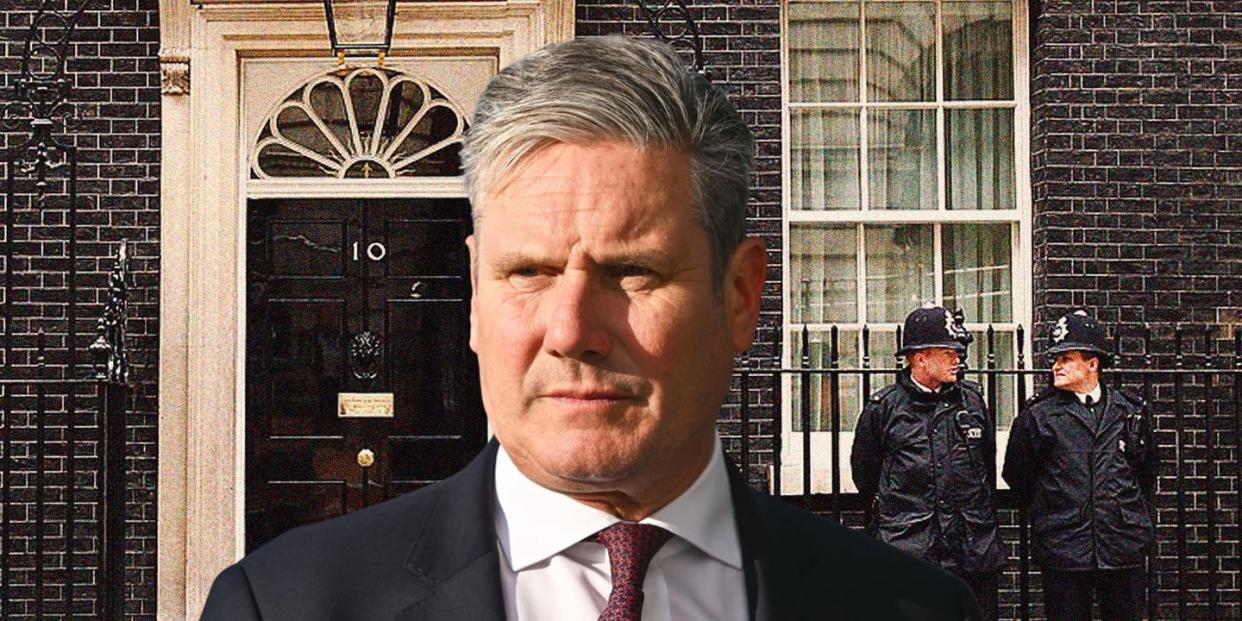
Happy ‘Bon Voyage Tories Day’ to all those who celebrate! Yep, this morning (July 5) the country awoke to find a shiny new Prime Minister in the form of Sir Keir Starmer, and waved goodbye to a 14-year Conservative reign in favour of a Labour government.
While it might sound like a big victory for the ones in red, who won by an overwhelming majority, many people still feel pretty tepid about the new government – it’s basically more of a loss for the Tories than it is a win for Labour, you could say.
So, based on his voting track record, what can we potentially expect from Starmer as our new PM – and who are the new key players in his Labour government? We take a deep-dive…
PS: To read more about Labour’s proposed policies included in its manifesto, see here – we did a whole breakdown on that when it first launched.
What’s the new PM’s general vibe then?
Beyond rumours that he’s the inspiration for Bridget Jones’ love interest Mark Darcy, Starmer is kind of known – at this precise moment in time – for being a bit ‘meh’ and for nudging the Labour party towards the centre-left, as opposed to hard left. Oh, and for u-turning on a number of issues: from referring to Jeremy Corbyn as a “friend” but later ousting him from the party, to pledging to scrap Universal Credit, only to later rescind on that. That’s earned him the nickname ‘Captain Flip-flop’. Starmer’s dad was also a toolmaker. Not sure if anyone heard about that?
When discussing his prospective Prime Minister-ship with The Times before the election, Starmer was asked if he would be a cautious leader. He responded that he would be “a serious prime minister, that is really important”, and sought to highlight how he has transformed the Labour party since taking over from Corbyn, claiming to have instilled “clarity of discipline and focus and seriousness”.
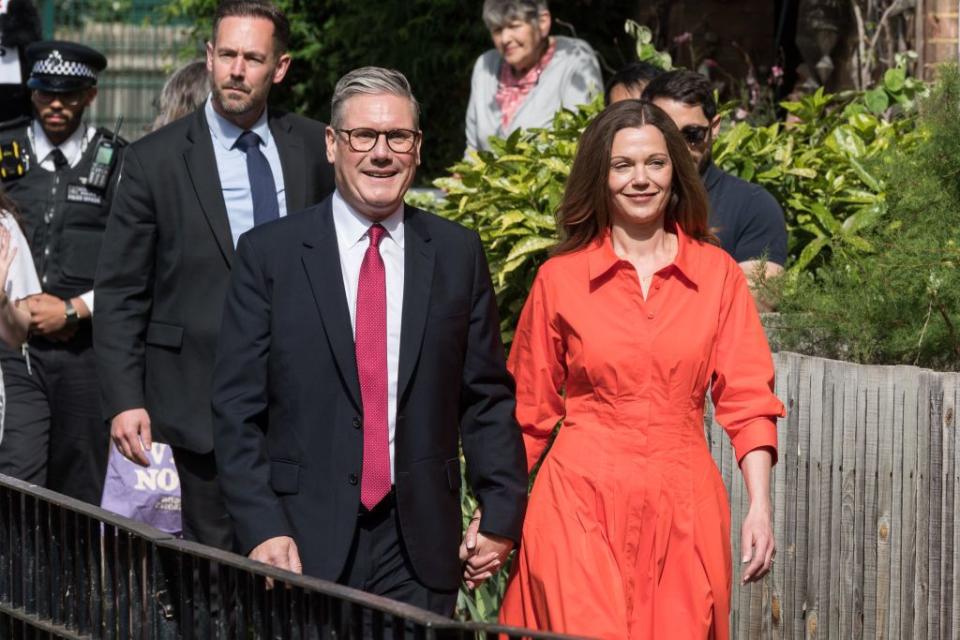
In addition to those topline notes, the former Chief Prosecutor of the Crown Prosecution Service had an impressive career as a human rights lawyer before entering politics full-time, which included bringing two of the men involved in Stephen Lawrence’s murder to justice. He has since brought Stephen Lawrence’s mother, Doreen, on board as an advisor on racial equality.
While being praised for that work, Starmer was also criticised by former PM Boris Johnson for ‘failing’ to prosecute sex offender Jimmy Savile when he had a chance as head of the CPS – however, context and details are key here. While Starmer was head of the CPS in 2009 when a decision was made not to convict Savile (on the basis of lack of evidence), he wasn’t the lawyer in charge of reviewing the case or directly involved. Later, Starmer commissioned a review into the case’s mishandling and criticised both the lawyers and police officers who were.
He stepped down from the CPS in 2013 and became an MP for Holborn and St Pancras two years later, going on to be elected leader of the Labour party in 2020.
On a non-work-related note, Starmer is a pescatarian, Arsenal supporter and has been married to Victoria (a solicitor who now works in occupational health for the NHS) since 2007. The pair share two children, a 16-year-old son and a 13-year-old daughter, who they’ve fought incredibly hard to keep out of the press. Up until this point, Starmer’s offspring have never been pictured or named publicly.
How has Keir Starmer voted in the past?
On women’s rights
Back in 2019, Starmer voted to legalise abortion in some circumstances in Northern Ireland and has generally been in favour of reducing obstacles in the way of those seeking an abortion.
In a recent interview, he emphasised Labour’s promise to halve violence against women and girls within a decade, suggesting plans require two terms in office to be fully realised. Starmer also added that he would implement domestic abuse specialists in 999 control rooms and create specialist courts for rape trials (along with rape investigation units in every force across England and Wales).
However, there’s been a lot of back and forth over his comments concerning trans people, what constitutes a woman and same-sex spaces. More on that below.
On LGBTQ+ issues
According to Starmer’s track record, he has voted in favour of same-sex marriages and has marched with LGBT+ Labour at London Pride on more than one occasion, but his comments relating to the trans community have been somewhat confused, divisive and upsetting for many.
In its manifesto, Labour outlined plans to scrap the board of doctors and lawyers who must approve someone’s Gender Recognition Certificate in favour of one doctor who specialises in gender issues – a positive step for trans people. In an open letter to Attitude, Starmer also promised a trans-inclusive ban on conversion practices, to commit to eradicating HIV by 2030 and to better support homeless LGBT+ youth.
However, the argument of who or what constitutes a ‘real’ woman (but conversely, less so how to define a ‘real’ man) has dogged all parties throughout the run-up to this election – Starmer included. As for the Prime Minister’s personal comments on the issue, when championing to reform the Gender Recognition Act in 2022, Starmer originally stated: “Trans women are women”.
More recently though, he said that trans women may not be welcome in certain single-sex spaces, such as gender-specific toilets or in sexual assault survival groups for women. When asked to respond to a tweet from gender critical/TERF (depending on your personal viewpoint) author, J.K Rowling, which asked “Do biological males with gender recognition certificates have the right to enter women-only spaces? It's a simple yes/no question, given that you intend to make it easier for men to gain said piece of paper”, Starmer said, “No, they don’t have that right. They shouldn’t.” and expressed a “willingness” to meet the Harry Potter writer. Understandably, these comments have caused major alarm for many trans people.
On housing
The new PM’s voting record details that he’s against phasing out secure tenancies for life and has pushed for landlords to bear the cost of paying for building safety works (a big issue following the tragic Grenfell Tower fire) and greater fire safety measures.
He’s pledged to make rental bidding wars a thing of the past too. During a radio interview with BBC Radio 5 Live he said: “Private landlords are often getting tenants or would-be tenants to bid against each other in an upward spiral and that means rent goes up and up and up. People who want to buy their own home are paying a massive amount of their income in rent, and we have to stop that [from] happening.”
On the NHS
Starmer has proudly proclaimed his love of the NHS, referencing the fact his mother was a nurse and his wife works within the NHS as evidence, multiple times. Historically, he’s voted against higher taxes specifically to fund the healthcare system and reforming the NHS so that GPs buy services on behalf of their patients, and in favour of allowing the terminally ill to end their own lives.
On immigration
Another divisive and poignant topic this election, Starmer has generally voted against having a stricter asylum system, and against stronger laws and enforcements of immigration laws, along with voting against making it easier to remove a person’s British citizenship.
He has openly referred to the Conservatives’ controversial Rwanda bill (involving sending asylum seekers to Rwanda, a country with poor human rights, at the cost of millions) as a “gimmick” and said it will be scrapped “straight away”. Starmer said the money saved from the scheme will go towards employing specialists to investigate small boats of people crossing the Channel – 60% of whom would be recognised as refugees if the UK Government processed their asylum applications, according to the Refugee Council.
On disability
On five occasions, Starmer has voted for paying higher benefits over longer periods for those unable to work due to illness or disability, but has been criticised by some organisations for Labour’s lack of commitment to working with disabled people when shaping policies that would impact them.
On anti-social behaviour
Given that more than 90% of crimes in the UK go unsolved and violent crimes have leapt from 634,600 offences in 2013-14 to over 2.1 million in 2022-23, there’s lots that Starmer’s new government needs to get cracking with. On this, Labour has pledged to fund 13,000 new neighbourhood-known police officers and Starmer has often repeated Tony Blair’s motto of wanting to be "tough on crime, tough on the causes of crime". Repeat adult offenders will also be banned from town centres via newly created Respect Orders and the party has pledged to halve knife crime within a decade, and update on progress within six months.
When meeting the families of fatal knife crime victims, Starmer called it a “moral mission” and said, “We will not fail on this issue. I will stop [sales of knives online being delivered and handed over without an ID check] straight away. It’s so outrageous that that can even happen.”
On the environment
Previously, Starmer has voted against adding a new terminal at Heathrow Airport (although new Chancellor, Rachel Reeves, has said she isn’t against this, so long as it meets environmental standards). He has voted in favour of measures trying to tackle climate change, improving air quality, having greater biodiversity and for the preservation of environmental protections after withdrawal from the EU.
Who is in the new Labour cabinet?
The new Labour cabinet (based on those previously in shadow roles prior to the party winning the election) is expected to comprise 47% women, with 10 in the 21 roles on offer. There will also be some familiar faces in the mix too, including Ed Miliband (Milifans rejoice!), Yvette Cooper and David Lammy.
Here, we detail a few of the likely key players:
Angela Rayner: Deputy Leader of the Labour party
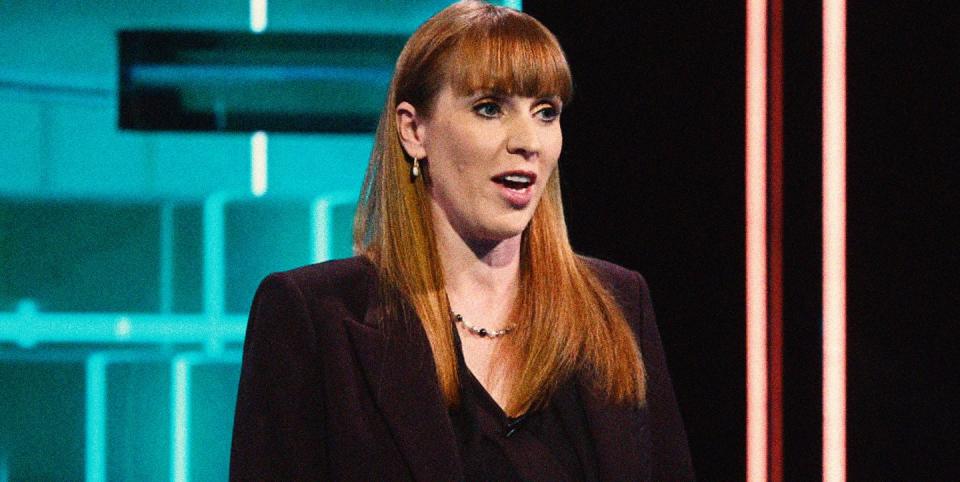
Many are excited to see self-described socialist Rayner in such a powerful position, breathing fresh air into politics via her background of becoming a teenage parent at the age of 16 and working as a carer, before becoming a trade union representative. You can read more about Rayner here, when Cosmopolitan UK spent a day with her.
Wes Streeting: Health Secretary
This MP also had an interesting upbringing, as detailed in his well-received memoir, One Boy, Two Bills and a Fry Up: A Memoir of Growing Up and Getting On, in which he recalls growing up in poverty with two teenage parents and dealing with homophobic bullies, before heading to Cambridge University and later surviving kidney cancer – for which he received treatment on the NHS. He’s given plenty of interviews about wanting to better utilise technology within the NHS, citing the development of the vaccine as an example of the potential, and paying staffers time and a half for weekend and evening shifts – an idea not everyone loves – in the hopes of creating 40,000 new appointments.
Rachel Reeves: Chancellor
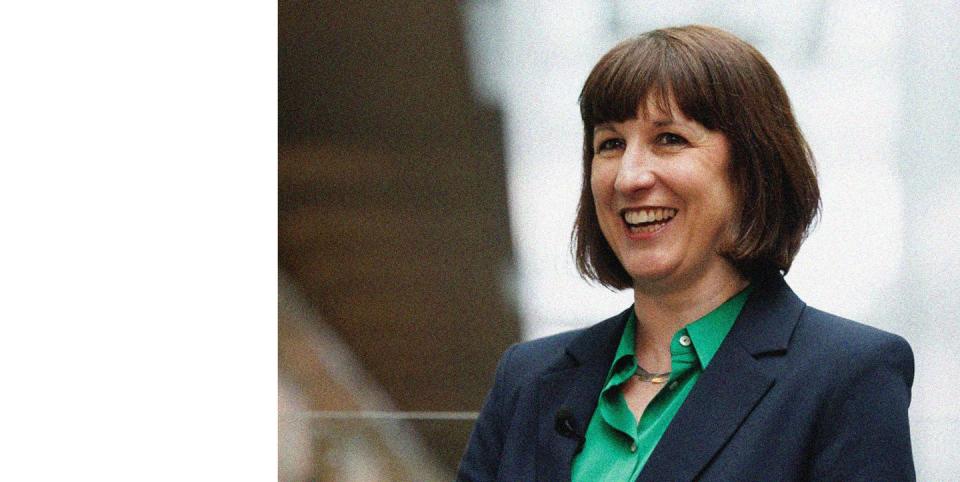
This is a key role and one formerly held by Rishi Sunak prior to becoming PM – and Reeves has been the Labour pick for it since 2021. Staggeringly, she’s also the first ever female Chancellor the country has had. Prior to becoming the MP for Leeds West over a decade ago, Reeves worked for the Bank of England as an economist, which puts her in good stead for the role. As for her anticipated approach to handling the country’s pursestrings, she’s said to be a fan of ‘securonomics’, which judging by a previous speech Reeves gave, involves being incredibly cautious, not taking loans and “building industries that guarantee Britain’s economic security, forging resilience at home, while creating new partnerships abroad”. Cool, cool.
David Lammy: Foreign Secretary
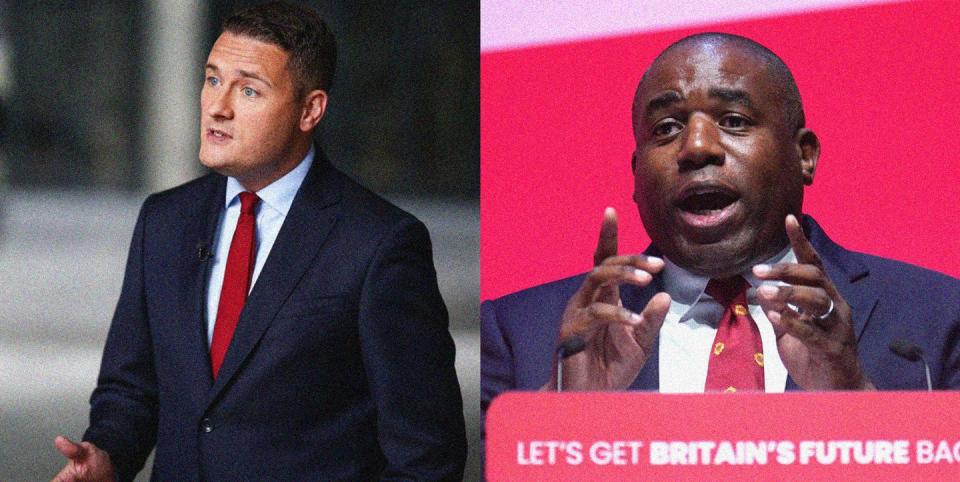
This isn’t Lammy’s first rodeo; he was appointed as a minister during both Tony Blair and Gordon Brown’s turns as PM. Lammy has also been the MP for Tottenham since 2000 and campaigns on the importance of fathers having an active role in the lives of their children. In his new position, the lawyer and politician will lead on national security, developing overseas relationships and promoting British interests abroad.
Ed Miliband: Secretary of State for Energy Security and Net Zero
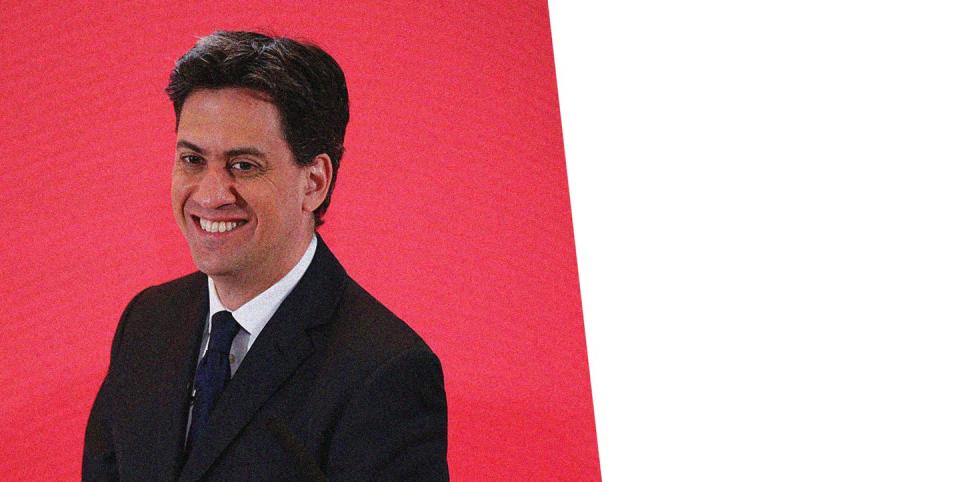
After having his political career cruelly upstaged by a bacon sandwich, Milibabes – a former Labour party leader (2010 - 2015) – is back with a bang and a shiny new job. He’s been tasked with heading up the creation of Great British Energy, which the Labour party pushed in its manifesto as “a new, publicly-owned clean energy company”.
Yvette Cooper: Home Secretary
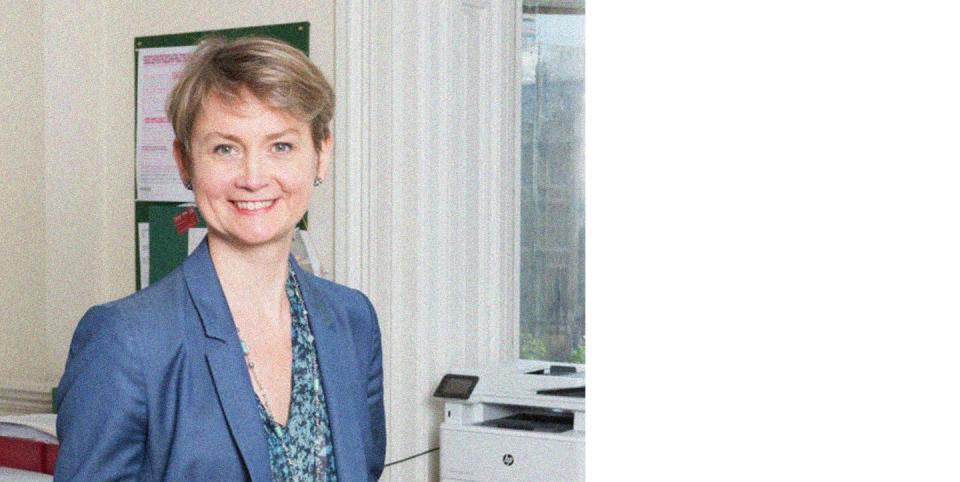
A true Labour OG, Cooper has been MP for Normanton, Pontefract and Castleford since 1997 and in her new role is in charge of policing, national security and immigration – a topic that drew much attention during the election campaign. Oh, and she’s married to former Labour MP, Ed Balls. Y’know, the guy who came sixth on Strictly back in 2016, and who, according to one YouTube comment managed “a helluva a lot: armography, tricky lifts and a belly slide that can't have been comfortable”.
Louise Haigh: Transport Secretary
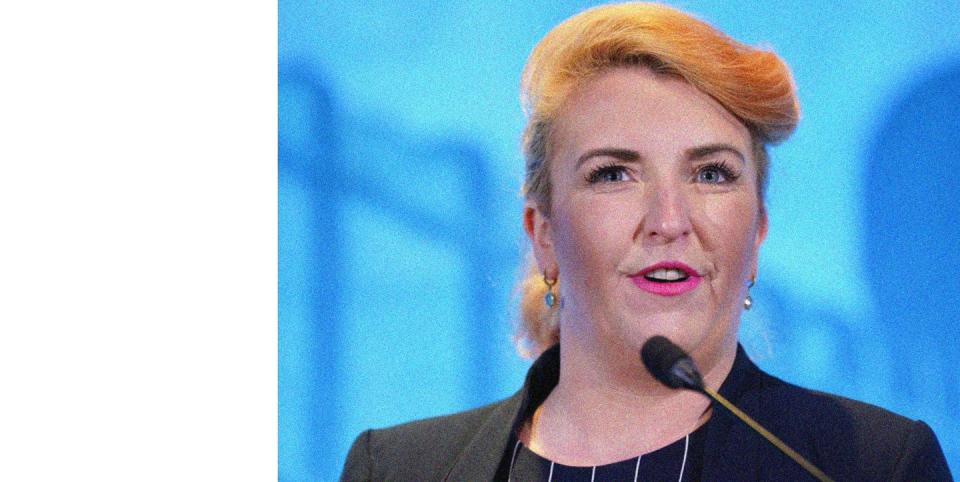
At 36-years-old, Haigh is the youngest Cabinet member and was once awarded the title of ‘hardest-working’ MP following a cross-party survey. The MP for Sheffield Heeley since 2015, Haigh will be tasked with setting up the Great British Railway, which Labour have promised will ensure smoother running services (although they haven’t committed to seeing a reduction in extortionate fares). In interviews, she comes across as down to earth and devoid of political jargon, so we’re excited to watch her career develop.
You Might Also Like

 Yahoo News
Yahoo News 
